新概念英语一册第69课
(完整版)新概念英语第一册69课
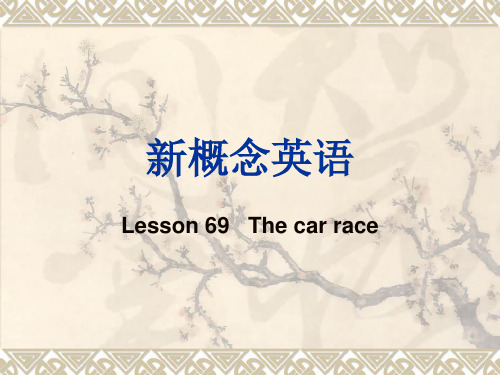
❖ There were twenty cars in the race. There were English cars, French cars, German cars, Italian cars, American cars and Japanese cars.
在比赛中
It was an exciting finish. The winner was Billy Stewart. He was in car number 15. Five other cars were just behind him.
新概念英语
Lesson 69 The car race
Word List
❖ crowd ❖ (1)集体名词“人群”,单数名词表示一堆
(一类)人,动词用复数。
❖ 例句:The crowd are noisy .人群很吵。 ❖ (2)in the crowd 在人群中
❖ (3)crowded adj.拥挤的 ❖ stand站立,起立
❖ It was an exciting finish. The winner was Billy Stewart. He was in car number fifteen. Five other cars were just behind him.
在第15号车里
❖ On the way home, my wife said to me, “Don’t drive so quickly! You are not Billy Stewart!”
在人群中
We are standing on the left.
on the right 在右面 turn left 左转 turn right 右转
[英语学习]新概念英语第一册讲义 Lesson 69-72
![[英语学习]新概念英语第一册讲义 Lesson 69-72](https://img.taocdn.com/s3/m/48065569336c1eb91a375da5.png)
© 2010 E.I. du Pont de Nemours and Company. All Rights Reserved.
6
Race的用法
• 2、race 可数名词“比赛” • (1)名词单数 + race …比赛(竞赛)horse race / car race / bicycle race • (2)be + in the race 参加比赛(可用于人或物) • (3)be + at the race 观看比赛(只用于人)例句:My wife and I were at the car race yesterday .例句:Were you in the horse race last Monday .例句:My father’s car was in the car race yesterday. • (4)近义词match 比赛(球类赛)(n.火柴)例句:I am watching the football match.
© 2010 E.I. du Pont de Nemours and Company. All Rights Reserved.
11
7、just= right +名词短语 • (1)“正好” 例句1:My house is just/ right near the sea.例句2: Don’t say , you mom is standing just behind you. 别说话,你妈妈就站 在你身后。 • (2)the very(adj) +n. “正好的” very 当副词时,译为“非常的” 例句:I am the very person for the job. 我是做这件事最好的人选。
© 2010 E.I. du Pont de Nemours and Company. All Rights Reserved.
新概念英语第一册单词 第69课:汽车比赛
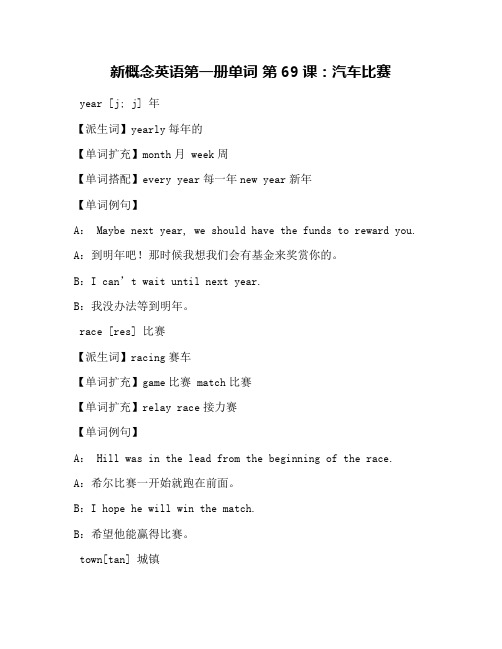
新概念英语第一册单词第69课:汽车比赛year [j; j] 年【派生词】yearly每年的【单词扩充】month月 week周【单词搭配】every year每一年new year新年【单词例句】A: Maybe next year, we should have the funds to reward you. A:到明年吧!那时候我想我们会有基金来奖赏你的。
B:I can’t wait until next year.B:我没办法等到明年。
race [res] 比赛【派生词】racing赛车【单词扩充】game比赛 match比赛【单词扩充】relay race接力赛【单词例句】A: Hill was in the lead from the beginning of the race.A:希尔比赛一开始就跑在前面。
B:I hope he will win the match.B:希望他能赢得比赛。
town[tan] 城镇【派生词】hometown故乡【单词扩充】umland郊区,城镇【单词搭配】downtown市中心,繁华区 town center城镇中心【单词例句】A: Living in the small town is very peaceful.A:住在小城镇很宁静。
B:Yes, but there are more chances in the city.B:是的,但是大城市机会更多。
crowd [krad] 人群【派生词】crowded拥挤的【单词搭配】a crowd of people 一群人 in crowds成群的【单词例句】A:Look there is a big crowd here tonight.A:看,今晚这儿人真多。
B: Yes, the show will soon begin.B:是的,演出马上就要开始了。
stand [stnd] v站立【派生词】standby候补【单词扩充】lie躺着【单词搭配】stand up起立 stand for代表 stand by袖手旁观【单词例句】A: Stand behind the line and wait for your tum, please. A:请站在线后等着轮到你。
新概念一册第69课语法+课文听力题目
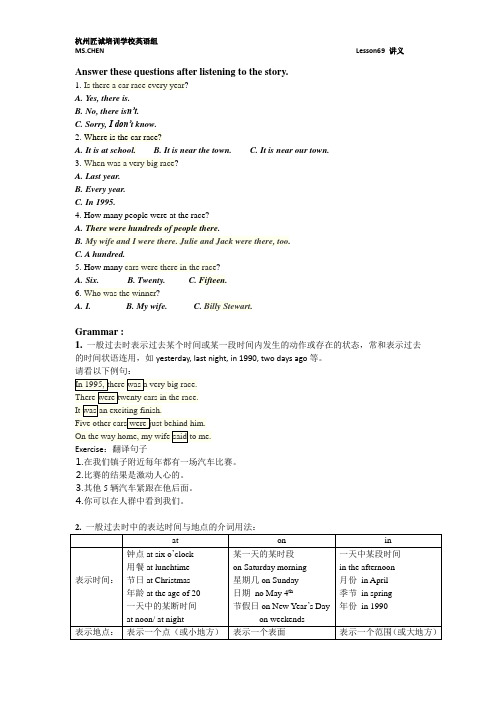
Answer these questions after listening to the story.1.Is there a car race every year?A.Yes, there is.B.No, there is n’t.C. Sorry, I don’t know.2.Where is the car race?A.It is at school.B. It is near the town.C. It is near our town.3.When was a very big race?st year.B.Every year.C.In 1995.4.How many people were at the race?A.There were hundreds of people there.B.My wife and I were there. Julie and Jack were there, too.C. A hundred.5.How many cars were there in the race?A.Six.B. Twenty.C. Fifteen.6.Who was the winner?A.I.B. My wife.C. Billy Stewart.Grammar :1.一般过去时表示过去某个时间或某一段时间内发生的动作或存在的状态,常和表示过去的时间状语连用,如yesterday, last night, in 1990, two days ago等。
请看以下例句:Exercise:翻译句子⒈在我们镇子附近每年都有一场汽车比赛。
⒉比赛的结果是激动人心的。
⒊其他5辆汽车紧跟在他后面。
⒋你可以在人群中看到我们。
Exercise:一、选择:1.—Where were you__________________April lst? —I was__________________the country.A.on; onB.in, inC.on; inD.in, on2.—Did you go to work______________May 16th? —No, I didn't. I went to Beijing__________ May. A.on; on B.on; in C.in; on D.in; in二、填空:1.I was__________________the grocer's yesterday.2.He goes to school_________________Sundays.3.She gets up__________________ten o'clock every day.Key phrases重点短语every year 每年hundreds of 数以百计的at the race 在赛场中in the crowd 在人群里on the left 在左边in the race 在比赛中on the way home 回家的途上。
新概念英语第一册69课
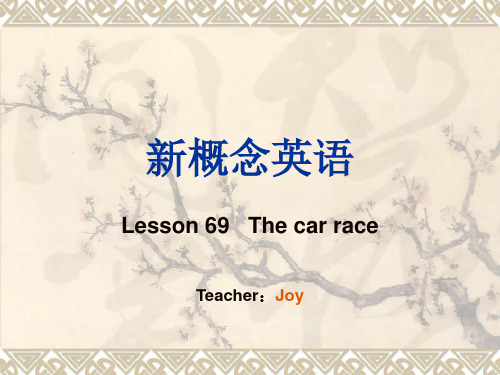
you and Penny/Australia/July Eg:When were you and Penny in Australia? We were in Australia in July. 1. You / the office / March 23rd 2. You and Sam/home/May 1st 3. Your family/Canada/2010 4. Your sister/Beijing University/last year
Sam / Monday ? School Eg:Where was Sam on Monday? He was at school on Monday. 1.Your father/1996? Here in China 2.you/Match 1st? Home 3. they/November? Turkey 4. Mr .and Mrs.Johnson/the weekend? The country
is,am—was 助动词 do---did are—were 实义动词 eat-ate go-went have-had come-came forget-forgot buy-bought think-thought be 动词
练习
改写下列句子。 用 yesterday 改写下列句子。 1. I am at the church now. 2. My son is at the school today. 3. We are at the office now. 4. There is a bus on the road. 5. Are there any cars here? 6. Here are some butterflies.
新概念英语第一册Lesson_69_the_car_race
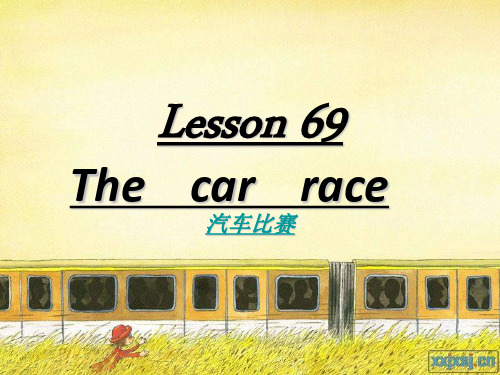
• On the way home… • 在回家的途中….
• On the way… 在… 的途中 • They were on their way to church. • We met last weekend this road about this
time.
• Year n. 年 • He was born in the year of 1980.
• A. New York • B. Washington D.C. • C. Washington
What’s the capital of Australia?
• A. Sydney • B. Canberra • C. Melbourne墨尔本
The United Kingdom
英国
What language do the people speak? 英国人说什么语言
town hall.
• A crowd of people: 一群人
• Stand v. 站立,看台,忍受
• the football match.
• The wounded soldier can’t stand the pain any longer.
Lesson 69
The car race 汽车比赛
CAR RACE?
场地赛有我们熟知的F1方程式,还有其他的比如雷诺方程式,宝马方程式,F3000方 程式,F2000方程式以及康巴斯方程式等等,还有比较著名的美国方程式也程印第 赛车等 以改装房车为参赛车辆的比赛就有很多,比如国际房车大师赛,STC超级 房车赛下面又分为英国房车赛BTCC、德国房车赛STW、瑞典房车赛STCC、义大利房 车赛ISCC都属於这一级次的比赛,近年欧洲最重要的超级房车赛Super Touring Car则是 国际级的欧洲房车赛ETCEuropean Touring Car,再比如GT房车赛,亚洲房车赛等等,近 些年都频繁的来国内比赛,让我们大家有了更加了解的机会 国内的场地赛是一个 新兴的项目,全国汽车场地锦标赛包括1600CC公开组系列赛、Polo杯全国场地挑战 赛、中国量产车赛(1600cc和2000cc)。都属于改装房车赛之列。 另外,不得不提的 就是勒芒24小时耐力赛,从大类上来说仍属于场地赛的范畴,但是其比赛形式以 及规则都是比较独特的 越野赛,我们耳熟能详的达喀尔拉力赛既属于此列,另外 除却国内的一些列越野比赛外,还有马来西亚丛林穿越赛等等著名的赛事 拉力赛, 这个就比较多了,许多国家都拥有自己的国家拉力赛,国内也是这样,一般分为S, N和超级千六3个组别。另外,也会有短道拉力赛等等,最著名的非世界拉力锦标 赛“WRC”莫数。 剩下的就是一些趣味竞赛,一般不由国际汽联直接参与管理,比 如说各国汽车爱好者组织的“直线竞速赛”,“大脚车赛”等等,也有厂商投资 发起的厂商杯单一品牌赛,比如国内的polo杯比赛就是一个很好的例子
新概念英语第一册第69课Lesson69课文单词知识点

【知识点讲解】1. 前天的课文中我们接触到了be 动词的过去式was 和 were ,大家还有印象吗?那今天我们就来学着把这两个词更广泛地运用到表达中去。
首先课文第一句There is a car race near our town every year. 从every year 我们可以看到这个活动是从过去一直持续到将来的、恒定的一个事件,所以这里用了一般现在时态There is... ;紧跟着,下一句话用in 1995这句话表示了事件发生在过去,因而转用一般过去式:there was... 接下来的第二段也用过去式叙述。
直到"You can see us in the crowd. We are standing on the left." 这里在课文中的情景是指着照片讲述故事,所以“你可以看到我们……”就用了一般现在时。
之后的段落就全部用一般过去式叙述了,全部使用的是was 或者 were 的表达,除了最后一句"My wife said to me..." 这里 said 是 says 的过去时。
要说明的是动词的过去时态就不再区分第一、第二和第三人称了,全部都是一种形式。
比如say, says 的过去时都是said 。
跟着said to me 后面的引号内的话,因为是直接引语,表示当时发生的事,所以也用了一般现在时。
2. hundreds of 意思是数以百计的人,表示很多人,不确定的数词。
除此以外也可以说thausands of... Lesson69There is a car race near our town every year. In 1995, therewas a very big race.There were hundreds of people there. My wife and I were atthe race. Our friends Julie and Jack were there, too. You can seeus in the crowd. We are standing on the left.There were twenty cars in the race. There were Englishcars, French cars, German cars, Italian cars, American cars andJapanese cars.It was an exciting finish. The winner was Billy Stewart. Hewas in car number fifteen. Five other cars were just behind him.On the way home, my wife said to me, 'Don't drive soquickly! You're not Billy Stewart!' 在我们镇子附近每年都有一场汽车比赛。
新概念英语第一册Lesson 69 the car race

• 2 A lot of students in our school were born____March, 1981. A. in B. at C. on D. since
•B
A
课文讲解
1、hundreds of… 数以百计的…… 用来表示不确定的数量。 类似的结构还有: thousands of 数以千计的 millions of 数以百万计的 当表示具体的数字的时候hundred用单数: 我有235本书。 I have two hundred and thirty five books.
There ____ twenty cars ___the race. There____ English cars, _____ cars, _____ cars, ______ cars, American cars, and _____cars.
It ____ an _____ finish. The ____ was Billy Stewart. He was ___car_____ fifteen. ____ other cars ____ just behind him.
___ the way home, my wife said ___ me, ‘ Don’t drive so ____! You are ___ Billy Stewart!’
新概念英语一册第69课

We also learn how to expand sentences by adding details and descriptions. This technique enriches language expression and makes communication more vivid and interesting.
Sentence pattern transformation and expansion
Sentence pattern transformation
We practice transforming sentences from one pattern to another, such as from active to passive voice or from simple to compound sentences. This helps improve language flexibility and enhances understanding of sentence structure.
Learning methods and suggestions
• Active participation: Students are encouraged to actively participate in classroom activities such as role-plays, group discussions, and pair work to improve their speaking and listening skills.
The passive voice is a grammatical construction used to show that the subject of the sentence is acted on by the verb. We examine the formation and use of the passive voice in this lesson.
新概念英语课件第69课
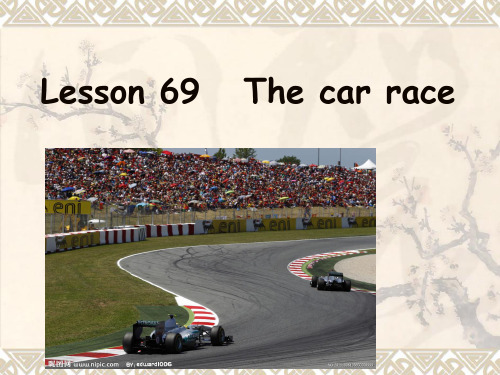
介词的用法
At:具体地点 at school at home
具体时间 at the weekend at 6 o’clock On:具体哪一天
on Monday on 1st August In:Байду номын сангаас糊时间与地点
in July in China
Exercises
用 at on in 完成句子
summary
一般现在时与一般过去时的用法 二者之间的转换 In on at介词的用法
一般过去时的应用
动词的过去式:在表示过去发生的事情时,句子中
的动词需要用过去式。
动词过去式的变化规则:
1.v+ed
clean-cleaned
2.以e结尾+d move-moved
3.不规则动词:
Here were some butterflies yesterday.
Lesson 70
When were they there?
stationer[`steiʃənə]
stationer’s 文具店
at the stationer’s
在文具店里
Denmark[`denmɑ:k]
Danish[`deiniʃ] 丹麦人 Where are you from ? I am from Denmark. What nationnality are you ? I am Danish.
everyday,but yesterday she forgot to do it.
There were hundreds of people there . My wife and I were at the race . Our friends Julie and Jack were there , too.
新概念英语第一册69课课文原文
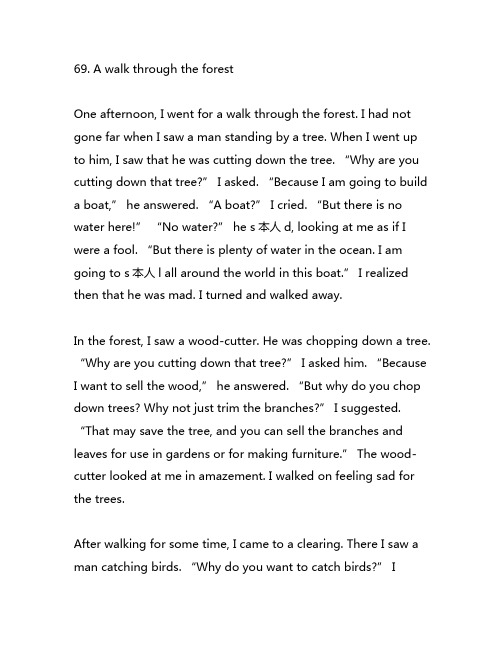
69. A walk through the forestOne afternoon, I went for a walk through the forest. I had not gone far when I saw a man standing by a tree. When I went up to him, I saw that he was cutting down the tree. “Why are you cutting down that tree?” I asked. “Because I am going to build a boat,” he answered. “A boat?” I cried. “But there is no water here!” “No water?” he s本人d, looking at me as if I were a fool. “But there is plenty of water in the ocean. I am going to s本人l all around the world in this boat.” I realized then that he was mad. I turned and walked away.In the forest, I saw a wood-cutter. He was chopping down a tree. “Why are you cutting down that tree?” I asked him. “Because I want to sell the wood,” he answered. “But why do you chop down trees? Why not just trim the branches?” I suggested. “That may save the tree, and you can sell the branches and leaves for use in gardens or for making furniture.” The wood-cutter looked at me in amazement. I walked on feeling sad for the trees.After walking for some time, I came to a clearing. There I saw a man catching birds. “Why do you want to catch birds?” Iasked him. “Because I want to sell them,” he replied. “But birds are meant to fly in the sky. You should not catch them and put them in cages,” I s本人d. “Having a bird in a cage is like being in j本人l. It is not right to take their freedom away.” The man shook his head in disbelief and continued with his work. I left the clearing feeling troubled.As I walked deeper into the forest, I saw a group of hunters. They were setting traps to catch animals. “Why are you trapping these animals?” I asked them. “Because we will sell their fur,” they answered. “But what about the poor animals?”I pleaded. “They have a right to live freely in the forest. It is not f本人r for us to take away their lives for our own benefit.” The hunters just laughed at me and carried on with their cruel task. I felt a great sorrow in my heart and left the forest.Note: This is the sixty-ninth lesson in the book New Concept English 1. It tells a story about a man who met various individuals in a forest and tried to persuade them to changetheir harmful actions towards nature. However, his efforts werein v本人n as they did not understand the importance of environmental conservation. The lesson teaches the readers about the value of nature and the need to protect it fromhuman exploitation. It emphasizes the significance of living in harmony with the environment and respecting the rights of animals and plants. The story carries a message of the responsibility each individual has in preserving the natural world for future generations.。
新概念英语第一册Lesson69
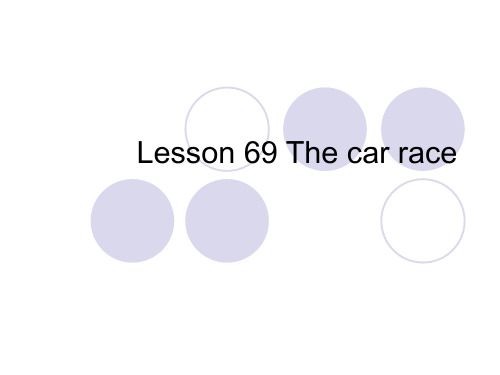
Words and expressions
year n. 年 race n. 比赛 (强调竞技性强、激烈的) town n. 城填 crowd n. 人群 stand v. 站立 exciting adj. 使人激动的 just adv. 正好,恰好 finish n. 结尾,结束 winner n. 获胜者 behind prep.在……之后 way n. 路途(抽象)
[语法 用介词 ,on和in的时间短语 语法] 介词at, 和 的时间短语 语法
1、用介词at的时间短语通常可表示:确切的时间(at 的时间短语通常可表示:确切的时间 的时间短语通常可表示 10 o’clock),用餐时间(at lunchtime),其他时刻 (at noon),节日(at Christmas),年龄(at the age of 27)等。介词 可表示地点,通常用于某个小 介词at可表示地点 通常用于某个小 介词 可表示地点 地点之前。 地点之前。 at the butcher’s;at the office 2、介词on用于周和月份中的任何一天之前若特指某个 时间的上午下午晚上夜里用on。 On Monday .on Jan.1st on the evening of may 1st 3、用介词 的时间短语 用介词in的时间短语 用介词 的时间短语:一天中的某段时间(in the evening),月份(in March),年份(in 1997),季 节(in spring),世纪(in the 20th century),节日 (in Easter week在复活节那一周),时期(in the holidays)等。
1. 2. 3. 4. 5. Let’s play the ______. Swimming is a healthful _______. Our team won the _______. All work and no_____makes Jack a dull boy. They played a basketball ______against another school. 6. You must never play ball ______in the classroom
新概念英语第1册第69-70课重点语法

新概念英语第1册第69-70课重点语法第69-70课的内容:一、重要句型或语法1、一般过去时表示过去发生的而现在已经结束的动作或状态。
本课主要学习的是There was/There were的用法,如:In 1995, there was a very big race. / There were hundreds of people there.2、介词:各种时间的表达1)in:一般后接月,份、季度和年份,如:in May, in summer, in 2008。
也会用于某些短语,如:in themorning/afternoon/evening。
2)on:一般后接具体日期或星期,表示具体哪一天。
如:on July 1st, 1921/on Saturday。
3)at:一般后接具体时刻,表示几点几分。
如:at 7o'clock/at 7:35。
二、课文主要语言点There is a car race near our town every year.1)可复习there is/are和一般现在时的用法。
2)race一般表示竞速类的比赛。
注意区分race与match(球类运动比赛等)。
There were hundreds of people there. hundreds of表示成百上千、数以百计,是一种概数。
如果要表达确定的数字,一般用作:基数词+hundred+名词,如:five hundred students,注意hundred 不能用复数,也不能再后接of。
My wife and I were at the race. be at the race,表示在比赛现场、观看比赛。
Our friends Julie and Jack were there, too. Julie and Jack作为myfriends的同位语,补充说明我的朋友叫什么名字。
You can see us in the crowd. crowd表示人群。
新概念英语第一册第69课ppt课件
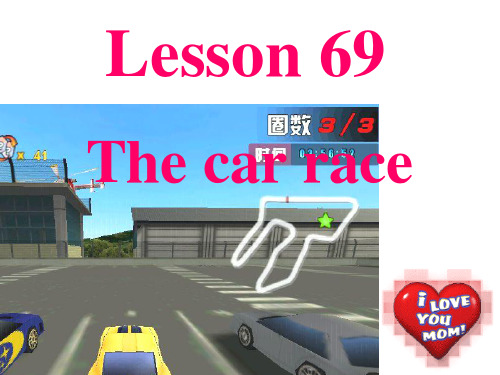
near our town every year. 每年
a horse race 赛马 a 10-mile race 10英里赛跑
every day/ week/ Monday…
In 1995,
在1995年
there was a very big race.
用介词at和in的时间短语
1、用介词at的时间短语通常表示: 确切的时间(at 10 o'clock) 用餐时间(at lunchtime) 其他时刻(at noon/night) 节日(at Spring Festival,Christmas
/jiə/ /reis/ /taun/ /kraud/ /stænd/ /iksaitiŋ/ /dʒʌst/ /finiʃ/ /winə/ /bihaind/ /wei/
/steiʃənə/
. /denma:k/
单词学习
• year • race • town • crowd • stand • exciting • just • finish • winner • behind • way
Lesson 69
The car race
.
at the baker’s
If you want to buy some
bread, where are you?
If you want to cut your hair short, where
are you?
at the hairdresser’s
you?
stationer at the stationer’s
Lesson 69
The car race
year n.年 race n.比赛 town n.城镇 crowd n.人群 stand v.站立 exciting a.使人激动的 just ad.正好,恰好 finish n.结尾,结束 winner n.获胜者 behind prop.在…之后 way n.路途 stationer n.文具商 Denmark n.丹麦
新概念英语第一册第69-70课精编版
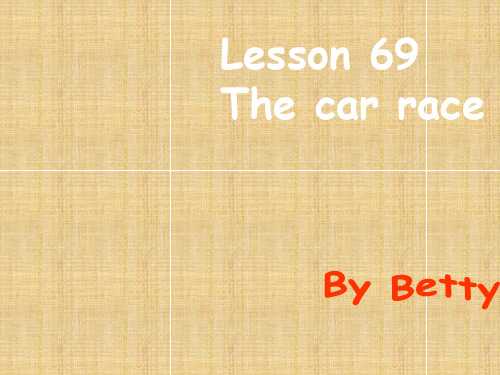
介词 at
1、用介词at的时间短语通常表示: 确切的时间、具体时刻(at 10 o’clock 10点整)
用餐时间(at lunchtime 午餐时间)
其他时刻(at noon/night 在正午/夜晚)
节日(at Spring Festival 在春节, at Christmas 在圣诞节。等没有day的节日)
It was an exciting finish. The winner was Billy Stewart. He was in car number___.Five other cars were just behind him.
(7) finish: n. ①结尾,结束。 It is an exciting finish. ②结束,完成。
I haven’t finished reading the book yet. (8) winner: n. 获胜者。
The winner is Betty. win: v. 获胜,赢。
2. Grammar
一般过去时态 be动词
be
现在式: am
is
are
过去式: was was were
There be
一般现在时
单:There is a/ an … 复:There are some …
一般过去时
单:There was a/an … 复:There were some …
There was an apple on the table yesterday .
There were some apples on the table yesterday.
be 动词口诀
肯定变否定,be后要把 not添, 肯定变疑问,遵循以下四个点, 1找、2提、3抄、4要变。
新概念英语第一册69-70课 详细

Mini
KIA
AUDI
Hyundai
Lincoln
Rolls Royce
NISSAN
.
Words ewbcsftxwjeiroytcunaoheiwatsincwaisytnedhrdgdr
.
• year • race • town • crowd • stand • exciting • just • finish • winner • behind • way
.
.
lotus GTE
.
.
Aston Martin 阿斯顿.马丁
阿斯顿.马丁是知名汽车品牌。加速性能优异是阿斯 顿.马丁跑车的最大特点,从静止启动加速到时速 100公里,仅需6秒。提到阿斯顿.马丁就会想到 007詹姆斯.邦德的传奇故事,似乎阿斯顿.马丁的 出名要归功于007。虽然英国车总是带有保守和固执 的绅士风格,但阿斯顿.马丁的每一种款式却总是久 负盛名,毫无过时之感。车标为一只展翅飞翔的大鹏, 分别注有阿斯顿、马丁英文字样。喻示该公司象大鹏 一样,具有从天而降的冲刺. 速度和远大的志向。
India
.
年、月、季节要加in 星期、日期要加on
at 、at几点了
.
【in】是“大姐”,因为后面所接的 都是较长时间(月、年、季节等)。
【on】是 “二姐”,后面所接的时 间多与日期有关(星期、日期、具体 时间、纪念日等)。
【at】是“小妹”,因为接在后面的 时间最短(具体时刻或某短暂时间)。
Good morning !.If you来自want to buy some
bread, where are you?
at the baker’s
If you want to cut your hair short, where
Lesson6970(课件)新概念英语第一册
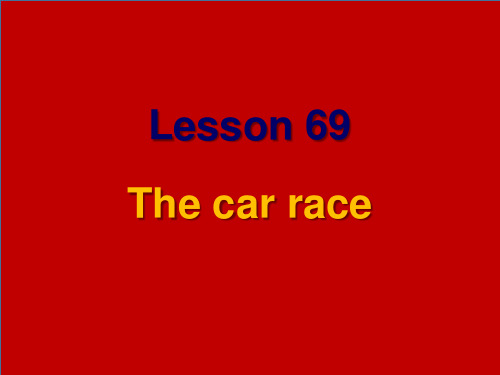
There are _a__ _c_ro_w__d_ _o_f_ sheep _o_n_ the grass.
Listen and answer: 1.How many people were there?
There were hundreds of people there. 2.Who were at the race?
1.How _w__a_s__(be) Jim's weekend? It _w__a_s__n_'t_(be not) bad. 2. _W__a_s__ (be) your mother a sales assistant last year? No, she __w__a_s_n_'_t__.
My wife and I were at the race. Our friends Julie and Jack were there, too.
3.How many cars were there in the race?
There were twenty cars in the race. 4.How was the finish?
winner /'w_i nə_/ n. 获胜者
Meaning:who wins the contest plu:winners 比赛的赢家
the winner of the race
win v.赢得
win-wins-won
win sth
他赢了这场比赛,他是很伟大的赢家。
He _w__o_n__ the race,he was the great _w__in_n_e_r__.
Watch and answer: Which car was the winner in 1995? The car number fifteen was the winner.
新概念69课课文原文
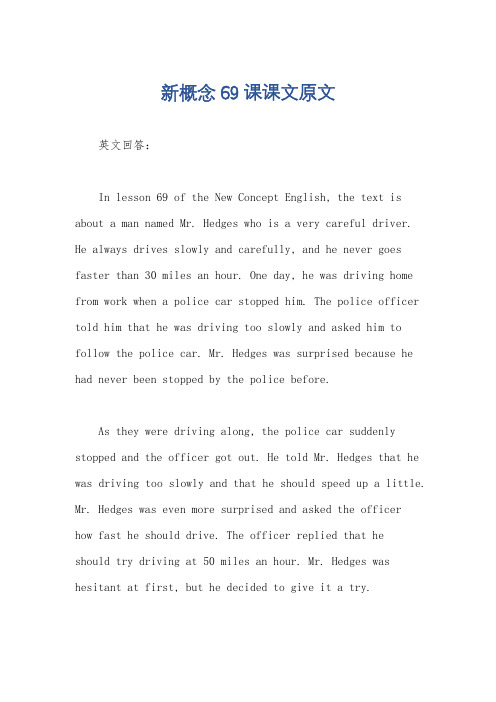
新概念69课课文原文英文回答:In lesson 69 of the New Concept English, the text is about a man named Mr. Hedges who is a very careful driver. He always drives slowly and carefully, and he never goes faster than 30 miles an hour. One day, he was driving home from work when a police car stopped him. The police officer told him that he was driving too slowly and asked him to follow the police car. Mr. Hedges was surprised because he had never been stopped by the police before.As they were driving along, the police car suddenly stopped and the officer got out. He told Mr. Hedges that he was driving too slowly and that he should speed up a little. Mr. Hedges was even more surprised and asked the officer how fast he should drive. The officer replied that heshould try driving at 50 miles an hour. Mr. Hedges was hesitant at first, but he decided to give it a try.After driving at 50 miles an hour for a while, Mr. Hedges felt more comfortable and realized that he had been driving too slowly all this time. He thanked the police officer for stopping him and giving him some advice. From that day on, Mr. Hedges became a more confident driver and was no longer afraid to drive faster when necessary.中文回答:在新概念英语第69课中,文章讲述了一个叫做赫奇斯先生的人,他是一个非常谨慎的司机。
